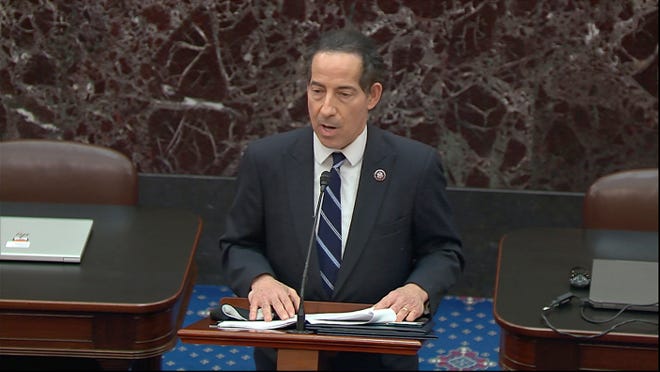
WASHINGTON – Former President Donald Trump's historic second impeachment trial will bring the nation's attention to Capitol Hill once more, but both the House managers and those representing Trump will look different from his first Senate impeachment trial in early 2020.
Trump has struggled to find and maintain a defense team, a remarkable change from the star-studded group that represented him for his first trial, including figures such as Ken Starr, who headed the investigation into former President Bill Clinton that led to his impeachment, and Alan Dershowitz, a constitutional law expert who defended O.J. Simpson.
More:The second Trump impeachment trial is set for February. What happens next?
The Democratic-led House impeached Trump and charged him with "incitement of insurrection" just a week after a deadly riot, led by a pro-Trump mob, broke into the Capitol on Jan. 6 while Congress counted the Electoral College votes of President Joe Biden's win.
The article of impeachment charges that by "spreading false statements" about the election and challenging the Electoral College results, Trump provoked supporters to break into the Capitol.
Here are the key Senate players you need to know:
Prosecutors
House Speaker Nancy Pelosi, D-Calif. chose nine lawmakers to serve as managers, whose roles are similar to those of prosecutors. The managers present the case for impeachment to the Senate and are among Democrats' last chance to persuade Republicans on the merits of the case.
The group is diverse, almost all hailing from different states and including a mix of newer and more prominent names.
All boast legal backgrounds that could play well to the buttoned-up Senate when the trial begins. Three are former criminal or military prosecutors.

Rep. Jamie Raskin, D-Md., will be lead manager, a duty Rep. Adam Schiff, D-Calif., held during Trump's first impeachment.
Raskin is chair of the Subcommittee on Civil Rights and Civil Liberties on the Committee on Oversight and Reform, as well as vice chair of the Subcommittee on the Constitution on the Judiciary Committee. He also serves on the Rules Committee and is vice chair for the Committee on House Administration.
A Harvard Law School graduate who taught constitutional law for more than two decades at American University, Raskin pointed to his knowledge of constitutional law as part of why Pelosi chose him, saying during an interview on CNN that "she wanted me to do it because she knows I've devoted my life to the Constitution and Republic."

Rep. Diana DeGette, D-Colo., was a civil rights attorney before holding public office and is now serving her thirteenth term in the House.
She serves on the Energy and Commerce Committee as chair of the Subcommittee on Oversight and Investigations.

Rep. David Cicilline, D-R.I., was a public defender in Washington, D.C., before joining Congress. He also was mayor of Providence, Rhode Island, and served in the Rhode Island House of Representatives.
In his sixth term in the House, he serves as chair of the Subcommittee on Antitrust, Commercial and Administrative Law on the Judiciary Committee. He also is on the Foreign Affairs Committee.
He was the lead author of the article of impeachment.
“Hundreds of domestic terrorists stormed the citadel of our democracy in an attempt to stop the peaceful transfer of power from one administration to the next,” Cicilline said the day of the impeachment vote. “They have failed.”

Rep. Joaquin Castro, D-Texas, was a litigator for a private practice before he was elected to the U.S. House. He served five terms in the Texas Legislature.
Now a fifth-term congressman, Castro is on the House Permanent Select Committee on Intelligence and the Foreign Affairs Committee, where he is the chairman of the Subcommittee on Oversight and Investigations.

Rep. Eric Swalwell, D-Calif., was a prosecutor before being elected to Congress. He chairs the Intelligence Modernization and Readiness Subcommittee for the House Permanent Select Committee on Intelligence. He also serves on the Judiciary Committee.
Swalwell investigated Trump’s first impeachment as a member of the Intelligence Committee.

Rep. Ted Lieu, D-Calif., is a former active-duty officer in the U.S. Air Force and a prosecutor in the Judge Advocate General’s Corps. He is a colonel in the Reserves.
In Congress, Lieu serves on the Judiciary Committee and the Committee on Foreign Affairs. He joined Raskin and Cicilline in drafting the article of impeachment.

Rep. Stacey Plaskett, D-V.I., was an assistant district attorney in the Bronx District Attorney’s Office in New York and as senior counsel at the Department of Justice before being elected to represent the United States Virgin Islands' at-large Congressional District.
In Congress, she serves on the House Ways and Means Committee.

Rep. Madeleine Dean, D-Pa., served in the Pennsylvania House of Representatives and as a lawyer in private practice before being elected to Congress.
She is a member of the Judiciary Committee, where she sit on the Subcommittee on Constitution, Civil Rights and Civil Liberties.
More:Ginni Thomas, wife of Supreme Court Justice Clarence Thomas, apologizes for pro-Trump remarks

Rep. Joe Neguse, D-Colo., was a litigator in private practice before coming to Congress.
Now in his second term, he serves as vice chair of the Subcommittee on Antitrust, Commercial and Administrative Law as a member of the Judiciary Committee. He also sits on the Natural Resources Committee and the Select Committee on the Climate Crisis.
Trump's defense team
Trump recently announced two new attorneys who will lead his impeachment defense team: David Schoen, a criminal defense attorney who works in Alabama and New York, and Bruce Castor Jr., a former district attorney in Pennsylvania. The duo was announced one day after it was reported that five members of Trump's team split with him. The day before the trial, a new name entered the picture: Philadelphia attorney Michael T. van der Veen, who works with Castor and heads a law firm and specializes in personal injury and criminal defense cases.

Both attorneys are no stranger to high-profile cases.
Schoen represented Roger Stone, a key Trump ally who was pardoned by the former president after charges stemming from the investigation into Russian meddling in the 2016 election.
Schoen also met with disgraced businessman Jeffrey Epstein days before his death in 2019 to discuss taking the lead role on his defense team. Schoen told the Atlanta Jewish Times he agreed to take the role representing Epstein against allegations the financial mogul sexually exploited and abused dozens of girls.
Castor garnered headlines after he declined to prosecute comedian Bill Cosby on sexual assault allegations that years later sent Cosby to prison after one of the actor's accusers, Andrea Constand, went to police in 2005.

Constand later sued Castor for defamation related to that case. According to reports, in 2019, the two parties settled the case out of court.
Opinion:Donald Trump's impeachment filing fails to make a case for acquittal
Trump and his first set of lawyers parted ways over trial strategy in late January. The former president wanted to emphasize "voter fraud" issues during the trial, said a person familiar with the legal discussions. But the original attorneys wanted to stress that the Senate should not hold a trial of a former officeholder and that Trump's comments during a Jan. 6 rally did not incite the mob that led to the Capitol riot.
Who will preside?
Sen. Patrick Leahy of Vermont, the longest-serving member of the Democratic majority, will preside over the trial rather than Chief Justice John Roberts.

Roberts presided over Trump’s first impeachment trial over the former president's dealings with Ukraine. But the Constitution calls for the chief justice to preside over trials of sitting presidents.
Leahy is the Senate pro tempore, meaning he is the presiding officer in the absence of the vice president, who is the president of the Senate.
He also serves as the vice chair of the Senate Appropriations Committee and is the senior-most member of the Senate Judiciary Committee and of the Senate Agriculture Committee.
Several Republican senators contend the trial is unconstitutional because Roberts is not presiding.
Contributing: Nicholas Wu, Christal Hayes, and David Jackson, USA TODAY
Source link








